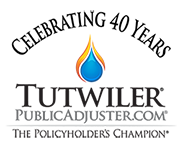Policyholders who experienced any type of water intrusion from Hurricane Irma may experience mold infiltration. When claims are delayed and repairs put on hold, it can become a real problem because mold can grow unseen for months and create a serious health hazard. Many of those who contact our firm report mold issues. To get more insight about mold: Read our Frequently Asked Questions about Mold Claims.
In the past, mold damage claims were covered under most property insurance policies when it resulted from a covered peril, such as a sudden plumbing leak, fire control, storm or other causes covered under your policy. However, some insurance carriers have been removing or scaling back mold coverage from their policy forms regardless if it results from a covered peril. Now some insurance companies are offering limited coverage for mold and fungus if you pay an additional premium payment.
Mold contamination should be taken very seriously. It can cause severe illness to some people and considerable damage to property. Before the changes to exclude mold coverage from policies, some carrier representatives would attempt to minimize the impact of mold often suggesting a little bleach as a solution. Unless you are dealing with visible mold in a very small area, this is far from an adequate solution. An article: Mold Spells Trouble by Tampa Bay Online offers some solid tips for dealing with mold.
If you have mold damage as a result of a flood claim that falls under your FEMA / NFIP flood insurance, that is a whole different story. According to the NFIP FAQ about mold coverage: “Damage from mold and/or mildew resulting from the after effects of a flood is covered, but each case is evaluated on an individual basis. Mold and/or mildew conditions that existed prior to a flooding event are not covered. After a flood event, the policyholder is responsible for taking reasonable and appropriate mitigation actions to reduce and/or eliminate mold and/or mildew. Reasonable actions taken to mitigate mold and/or mildew are covered (for example, the use of responsible drying-out techniques or application of mildicide at a reasonable cost).” The lesson here is to make sure you know what type of policy you are seeking coverage under and understand what is and is not covered under your policy.
One final note, beware insurance company representatives who quote the policy exclusions for mold even when some coverage may exist for your mold damage. Simple water damage claims can become complicated. Have someone who understands policy language review your policy. A public adjuster can help you manage your overall insurance claim, ensure your mold damage is assessed properly and advise the necessary course of action.
If you have questions regarding any property insurance related issue caused by Hurricane Irma please call 800-321-4488 or contact a licensed Florida Public Adjuster to submit a question to one of our insurance claim experts.

